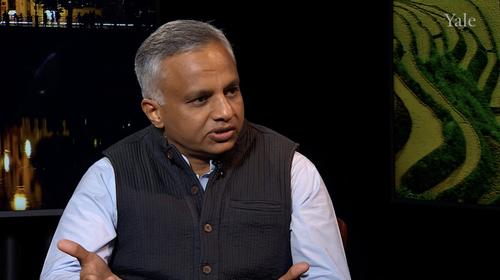In the space of just a semester, Sushant Singh has certainly left his mark on the South Asian Studies Council. Regulars at Luce Hall are now accustomed to the sight of Singh animatedly engaging an interlocutor in conversation; those who work behind the scenes in Suite 210, meanwhile, know even better the energy, drive and expertise that Singh has brought to the Council this semester. A Deputy Editor at The Indian Express, Singh joined Yale as a visiting faculty member for the Fall 2019 semester. In his time here, Singh taught a class on national security in India, participated in a panel discussing the current situation in Kashmir, delivered a lecture on the NRC process in Assam, and was pivotal in putting together the “State of India’s Institutions” Panel that brought together experienced practitioners from the country.
With Singh now returning to India, our South Asia Fellow Ram Vishwanathan was able to catch up with him for an interview on his time here.
Vishwanathan: What did you seek coming here, and what did you receive?
Singh: I came here looking for a totally different experience. I wanted to teach and learn in an academic environment, and I hoped to benefit from interactions with other academics and students. Of course, I enjoyed some unexpected surprises. One was the sheer amount of reading and thinking I was able to do. This was a bonus that was rather unusual for me to enjoy, given that I was used to a job that resembles running on a treadmill 24/7. I also benefitted greatly from working with the Council, organizing events and giving talks.
Vishwanathan: What do you think is the role of a practitioner in academia?
Singh: I’m quite clear: a practitioner comes into the question only once a theoretical framework has been established. You can’t put a cart before a horse. But a practitioner can then put real situations into these theoretical conceptualizations, and explain, challenge or interrogate academic theories. And for the practitioner, it is of course a huge learning to share ideas with faculty and students who have thought rather deeply about these topics.
Vishwanathan: How do you see the role of academia developing in today’s South Asia? Should academics be involved in resistance, for example?
Singh: In the context of what’s happening in South Asia today – in politics, society and economics – academics take on a huge significance. Academics need to use their expertise to shine light on societal questions, and be bold public intellectuals, educating the larger public about the emerging situations we face. On a broader level, academics can imagine the very values and ideas that form the basis of our societies. This is something I’ve very much grown to appreciate here – academia organizes itself politically and wears its values on its sleeve. This allows for a healthy democracy and for academia to exist as a strong, independent institution.
Vishwanathan: Has academia lived up to this task?
Singh: Just as anyone with ties to a particular geography would argue, I’d like to see more of an emphasis placed on South Asia. Should there be more done? Yes - and particularly given the critical challenges it faces today.
Vishwanathan: What are a few anecdotes that you will remember from your time here?
Singh: I will definitely remember the panel the students organized on Kashmir. I was so pleasantly surprised to see the response we on the panel received: we had a huge audience, people drove as many as 200 miles to attend, asked frank, personal and probing questions, but handled what is such a sensitive topic with honesty and without confrontation. I also really enjoyed teaching my seminar class – the level of interest shown by my students and their intellectual caliber was incredible. If that was a representative sample of undergraduates at Yale, then… Wow!
Vishwanathan: How was the experience of teaching?
Singh: It was very enriching and fulfilling. I’ve already spoken to the quality of my students, but the support I received from the university was also incredible. They made sure to offer every form of support I might have possibly needed.
Vishwanathan: On to some lighter topics – what is the best food you’ve had here?
Singh (after a pause): It would be a close contest between Sally’s Apizza and Thai food, at September by Bangkok. Let me say the Thai food as I have fond memories of a delicious meal there on a lovely summer day with Rohit De and Supriya Gandhi!
Vishwanathan: How was your experience here, in a different cultural environment? What surprised you the most, and what did you enjoy the most?
Singh: I really enjoyed the progressive values that people hold so dear. I was initially surprised, for example, by the use of personal pronouns in introductions – I had never encountered it much before. But throughout my time here, I’ve really felt a sense of dignity given to every human being, irrespective of their socio-economic status, and really cherish that ideal.
Vishwanathan: What are your plans for the future?
Singh: I will rejoin The Indian Express as Deputy Editor, and return to working in journalism. The rest, of course, depends on the trajectory of the newspaper and the wider Indian environment. But I will try to stay true to my newspaper’s motto – of raising awareness, speaking truth to power, and preserving the “Journalism of Courage.”


